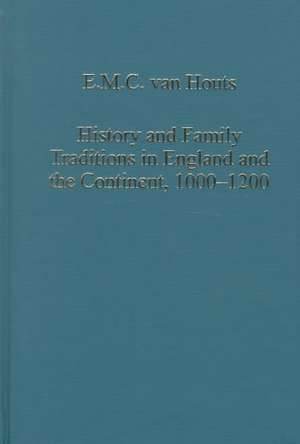History and Family Traditions in England and the Continent, 1000-1200: Variorum Collected Studies
Autor E.M.C. van Houtsen Limba Engleză Hardback – 28 noi 1999
Din seria Variorum Collected Studies
-
 Preț: 311.18 lei
Preț: 311.18 lei -
 Preț: 310.55 lei
Preț: 310.55 lei -
 Preț: 299.55 lei
Preț: 299.55 lei - 18%
 Preț: 949.32 lei
Preț: 949.32 lei -
 Preț: 386.77 lei
Preț: 386.77 lei -
 Preț: 351.48 lei
Preț: 351.48 lei -
 Preț: 313.38 lei
Preț: 313.38 lei -
 Preț: 386.77 lei
Preț: 386.77 lei -
 Preț: 311.41 lei
Preț: 311.41 lei -
 Preț: 310.22 lei
Preț: 310.22 lei -
 Preț: 343.33 lei
Preț: 343.33 lei - 9%
 Preț: 938.44 lei
Preț: 938.44 lei -
 Preț: 311.41 lei
Preț: 311.41 lei - 9%
 Preț: 938.85 lei
Preț: 938.85 lei -
 Preț: 312.75 lei
Preț: 312.75 lei - 9%
 Preț: 936.60 lei
Preț: 936.60 lei -
 Preț: 341.55 lei
Preț: 341.55 lei -
 Preț: 320.00 lei
Preț: 320.00 lei - 34%
 Preț: 764.20 lei
Preț: 764.20 lei - 22%
 Preț: 312.43 lei
Preț: 312.43 lei - 34%
 Preț: 739.65 lei
Preț: 739.65 lei - 34%
 Preț: 764.20 lei
Preț: 764.20 lei - 34%
 Preț: 680.73 lei
Preț: 680.73 lei - 26%
 Preț: 247.40 lei
Preț: 247.40 lei - 34%
 Preț: 485.78 lei
Preț: 485.78 lei - 34%
 Preț: 764.20 lei
Preț: 764.20 lei - 34%
 Preț: 769.51 lei
Preț: 769.51 lei - 34%
 Preț: 764.20 lei
Preț: 764.20 lei - 34%
 Preț: 826.68 lei
Preț: 826.68 lei - 25%
 Preț: 222.32 lei
Preț: 222.32 lei - 25%
 Preț: 225.54 lei
Preț: 225.54 lei - 34%
 Preț: 767.07 lei
Preț: 767.07 lei - 34%
 Preț: 764.20 lei
Preț: 764.20 lei - 34%
 Preț: 736.38 lei
Preț: 736.38 lei - 34%
 Preț: 738.42 lei
Preț: 738.42 lei - 25%
 Preț: 226.52 lei
Preț: 226.52 lei - 33%
 Preț: 491.66 lei
Preț: 491.66 lei - 34%
 Preț: 485.78 lei
Preț: 485.78 lei - 34%
 Preț: 485.78 lei
Preț: 485.78 lei - 34%
 Preț: 764.20 lei
Preț: 764.20 lei - 34%
 Preț: 736.38 lei
Preț: 736.38 lei - 31%
 Preț: 473.94 lei
Preț: 473.94 lei - 18%
 Preț: 807.71 lei
Preț: 807.71 lei - 34%
 Preț: 764.20 lei
Preț: 764.20 lei - 34%
 Preț: 764.20 lei
Preț: 764.20 lei - 34%
 Preț: 764.20 lei
Preț: 764.20 lei - 51%
 Preț: 485.78 lei
Preț: 485.78 lei - 34%
 Preț: 485.78 lei
Preț: 485.78 lei - 34%
 Preț: 766.65 lei
Preț: 766.65 lei - 34%
 Preț: 769.10 lei
Preț: 769.10 lei
Preț: 764.20 lei
Preț vechi: 1154.58 lei
-34% Nou
Puncte Express: 1146
Preț estimativ în valută:
146.30€ • 150.46$ • 121.37£
146.30€ • 150.46$ • 121.37£
Comandă specială
Livrare economică 30 ianuarie-13 februarie
Doresc să fiu notificat când acest titlu va fi disponibil:
Se trimite...
Preluare comenzi: 021 569.72.76
Specificații
ISBN-13: 9780860787839
ISBN-10: 0860787834
Pagini: 374
Dimensiuni: 150 x 224 x 22 mm
Greutate: 0.45 kg
Ediția:1
Editura: Taylor & Francis
Colecția Routledge
Seria Variorum Collected Studies
Locul publicării:Oxford, United Kingdom
ISBN-10: 0860787834
Pagini: 374
Dimensiuni: 150 x 224 x 22 mm
Greutate: 0.45 kg
Ediția:1
Editura: Taylor & Francis
Colecția Routledge
Seria Variorum Collected Studies
Locul publicării:Oxford, United Kingdom
Public țintă
Academic and PostgraduateCuprins
Contents: Norman literary links: Normandy and Byzantium in the eleventh century; Scandinavian influence in Norman literature of the eleventh century; A note on Jezebel and Semiramis, two Latin Norman poems from the early eleventh century; The date of Warner of Rouen’s Moriuht; Historiography and hagiography at Saint-Wandrille: the Inventio et Miracula Sancti Vulfranni; Anglo-continental prose texts: The political relations between Normandy and England before 1066 according to the Gesta Normannorum ducum; The Ship list of William the Conqueror; The Brevis relatio de Guillelmo nobilissimo comite Normannorum written by a monk of Battle Abbey, edited [and translated] with an historical commentary; The Norman conquest through European eyes; Latin and vernacular Anglo-Norman poetry: Latin poetry and the Anglo-Norman court 1066-1135: the Carmen de Hastingae Proelio; Wace as historian; The adaptation of the Gesta Normannorum Ducum by Wace and Benoît; History, family and women: Robert of Torigni as genealogist; The state of research: women in medieval history and literature; Women and the writing of history in the early Middle Ages: the case of Abbess Matilda of Essen and Aethelweard; Orality in Norman hagiography of the XIth and XIIth centuries: the value of female testimonies; Index.
Recenzii
'The fifteen essays that comprise this collection draw together work of one of the most able historians of the period of contact between England and Normandy prior to and following on the Norman invasion.... van Houts's essays are exemplars of fine historical methodology, from which students and scholars alike will benefit.' Canadian Journal of History
Descriere
The Normans in France and England left a rich legacy in historiography and literature, which is the subject of this volume. Dr van Houts first deals with the Scandinavian inheritance, which together with contacts with Danish England and Byzantium led to an interesting mix of pagan and ecclesiastical themes. Next she analyses the propaganda that followed the Norman conquest of England, in which the panegyrics written by French clerks eager to gain favour contrast markedly with the almost unanimous condemnation of William’s actions on the Continent. Included is the earliest history of the battle of Hastings written in England, here published with a new English translation. The last papers consider the role of women in the transmission of knowledge about the past: in their families they passed on memories, and their importance as commissioners, readers and informants of chroniclers must also not be underestimated.
